|
|
|
Sort Order |
|
|
|
Items / Page
|
|
|
|
|
|
|
| Srl | Item |
| 1 |
ID:
125195
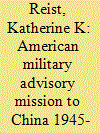

|
|
|
|
|
| Publication |
2013.
|
| Summary/Abstract |
The Pacific War ended in 1945 before the American government had established a plan for the implementation of its postwar goals for its relationship with China. Although China lacked unification, the Guomindang (GMD), the "allied" government, sought to create a more modern military along American lines, with American equipment, using American advisers and funding. GMD leaders did not want American influence or control, desiring to maintain their culturally organized structures and ways of functioning, including the use of guanxi (personal networks and favors). The Joint U.S. Military Advisory Group attempted to operate within this nexus of conflicting goals, purposes, and missions.
|
|
|
|
|
|
|
|
|
|
|
|
|
|
|
|
| 2 |
ID:
163348
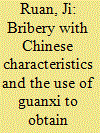

|
|
|
|
|
| Summary/Abstract |
Some scholars have attempted to find ways to distinguish guanxi from bribery, which can be difficult due to the role played by four traditional Chinese concepts and practices. First, people value the renqing ethic more than law, making it hard to judge whether a relation has “improper inducements.” Second, some interaction rituals used in bribery guanxi are a type of moral performance, undertaken to justify immoral practice – this mixes together guanxi practice with bribery. Third, some of the “ganqing” (affection) and esteem expressed in bribery guanxi results from this moral performance, rather than from genuine affection and esteem. Fourth, some people try to embody their relationship as an enduring guanxi, rather than one-off bribery, which exacerbates the difficulty in distinguishing guanxi from bribery. Because of the moralizing culture and the custom of mixing together renqinq and bribery, it can be difficult to distinguish bribery from guanxi by attempting to judge whether an action is purely based on esteem or coercion, on an enduring relationship or a one-off exchange, on improper inducement or proper conduct, or other such formal distinctions.
|
|
|
|
|
|
|
|
|
|
|
|
|
|
|
|
| 3 |
ID:
160817


|
|
|
|
|
| Summary/Abstract |
Although the role of Guanxi in China as a form of relationship marketing (RM) has received increasing attention in recent years, few empirical studies have indicated that Guanxi has more impact on performance than RM in the Chinese market. Foreign-invested enterprises (FIEs) may have some difficulty in fully practicing RM in China without considering the influence of Guanxi. In this regard, this study is guided by the following research question: “In China, which factors influence the differences in the impacts created by RM and Guanxi?” In this study, we first provide an overview of previous research on Guanxi, focusing on the fundamental differences between Guanxi and RM. We then provide an empirical analysis of the differential effects of Guanxi and RM on firm performance by investigating 297 FIEs in China. The results suggest that Guanxi and RM are not trade-off options in today’s Chinese market. Guanxi and RM have synergetic effects on firm performance, that is, they have differential effects based on the mode of market entry and the competitive structure. Guanxi is more likely to influence firm performance for collaboration-based entry firms rather than entry without collaboration firms, whereas RM is more likely to influence firm performance when FIEs’ main competitors are foreign firms than when they are local firms.
|
|
|
|
|
|
|
|
|
|
|
|
|
|
|
|
| 4 |
ID:
190653
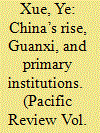

|
|
|
|
|
| Summary/Abstract |
This article focuses on how China views the normative structure of the international order. It integrates the Chinese cultural idea of guanxi into the established English School tradition in International Relations theory and argues that the norm of guanxi is an emerging pluralist primary institution. In this article, the author first presents the emergence of guanxi as a purposive norm in China’s foreign policy, and the interplay of this norm between China and other international actors. Second, the article scrutinizes the establishment of secondary institutions reflecting the norm of guanxi. Third, this article discusses how this primary institution has been consolidated at regional and global levels. In conclusion, this article briefly draws on two major developments of international politics: the cultural diversity of the international order and the emergence of a China-centred international society.
|
|
|
|
|
|
|
|
|
|
|
|
|
|
|
|
| 5 |
ID:
141091
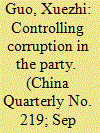

|
|
|
|
|
| Summary/Abstract |
This article investigates a prominent but little discussed CCP central organ, the Central Discipline Inspection Commission (CDIC), and its local discipline inspection commissions (DICs) in the post-Mao era. It analyses how the CCP exerts its control over the disciplinary organizations and argues that the disciplinary agencies' lack of autonomy hinders their efforts to crack down on corruption. This article investigates the important role played by the CDIC in CCP politics by examining its organizational structure, modes of operation and criteria for imposing disciplinary sanctions, and evaluates the measures and approaches employed by the Party's disciplinary organizations to combat corruption. The study concludes that structural, institutional and cultural factors hinder the effectiveness of the CCP's disciplinary agencies in their efforts to control Party members, officials and corruption.
|
|
|
|
|
|
|
|
|
|
|
|
|
|
|
|
| 6 |
ID:
154824


|
|
|
|
|
| Summary/Abstract |
As China continues to open up to the transnational circulation of labor, ideas, technology and capital under globalization, we must wonder: will Chinese society’s more cosmopolitan and transnational groups continue to be guided by guanxi? The authors conducted 40 in-depth interviews with Chinese physicists at 11 research universities in three cities in order to examine the role of ethics, including guanxi, in the professional lives of one of China’s most cosmopolitan populations, the elite scientific community. Analysis reveals, counter-intuitively, that Chinese physicists very much think about guanxi in relation to their research grants and scientific collaboration, that the ethical connotation of guanxi is contextual, and that some see it as a double-edged sword. They realize that guanxi can empower the individual scientist and the scientific community even as it weakens them both.
|
|
|
|
|
|
|
|
|
|
|
|
|
|
|
|
| 7 |
ID:
089197
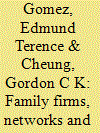

|
|
|
|
|
| Publication |
2009.
|
| Summary/Abstract |
Chinese family enterprises in the United Kingdom have penetrated many different sectors of the economy, including restaurants, wholesaling, retailing, trading, manufacturing, property development, computer services and investment holding. Among the companies in these sectors, those involved in different segments of the food industry, as manufacturers, retailers and wholesalers, reputedly feature characteristics of Chinese culture. A majority of these enterprises, for example, function as family firms. This study explores the assertion that, among companies owned by ethnic minorities, culture strongly influences form of business development. This argument will be assessed through a focus on Chinese food-based enterprises in the UK. Two family-controlled companies, Seven Seas (Frozen Food) Ltd and Dayat Foods Packaging Ltd, were selected as case studies as they are involved in key business components of the Chinese food chain industry. Through an in-depth comparative study of the history and development of these two firms, we consider the argument that Chinese businesses have evolved well because of family ties and their inclusion in mutually-beneficial ethnically-constructed networks. Through these case studies, we provide an alternative perspective to diasporic Chinese business development which brings into question the extensive use of the concept of ethnic enterprise.
|
|
|
|
|
|
|
|
|
|
|
|
|
|
|
|
| 8 |
ID:
158632
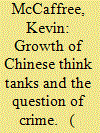

|
|
|
|
|
| Summary/Abstract |
This paper reviews several of the key issues that underlie the development and expansion of think tanks in China from both a domestic and international perspective. Substantively, the review focuses on the need to develop criminological think tanks in China due to the well-documented relationship between rapid urbanization, social displacement, and crime. Though work on urbanization, social disorganization, and crime has existed for over half a decade in Western criminology, it suffers from a lack of research outside of the Western and usually more specifically American, cultural context. To advance this call for research, the paper identifies 14 generative research programs in the areas of the Routine Activities Theory, Social Bonds Theory, and Institutional Anomie Theory pursuable by Chinese criminological think tanks. The paper concludes with a brief discussion of some potential barriers to the successful production and dissemination of criminological research in China.
|
|
|
|
|
|
|
|
|
|
|
|
|
|
|
|
| 9 |
ID:
174414


|
|
|
|
|
| Summary/Abstract |
Using tobacco industry workers’ applications for Wuhu General Labor Union (蕪湖總工會 wuhu zong gonghui), this article examines the role of guanxi (關係) in job searches before and after the socialist transformation in the early 1950s. We reject the conventional view that guanxi was extensively used in the early socialist system. Rather, guanxi, particularly kin ties, was vital for obtaining good jobs before the socialist transformation, but its role was sharply restricted after the job assignment system was established in the early 1950s. This system was particularly advantageous for workers who were young and female and lacked appropriate guanxi to access good jobs. These findings suggest that a more accurate understanding of the early socialist period would enrich the debate about the role of guanxi in market reform.
|
|
|
|
|
|
|
|
|
|
|
|
|
|
|
|
| 10 |
ID:
161573


|
|
|
|
|
| Summary/Abstract |
The phenomenon of China’s rise has urged some to look for International Relations (IR) theories with ‘Chinese characteristics’. A number of these have been associated with the ‘relational turn’. Yet, attempts to bring the Anglophone and the Sinophone strands of the relational turn have failed to transcend the bifurcating metanarrative of the mainstream. To rectify this trend, the analysis engages the literatures on guanxi, the relational turn, and Chinese IR and develops a normative claim about the underlying relationality of knowledge production in post-Western IR. The contention is: (i) that the criticism of substantialism offered by the Anglophone literature on the relational turn fails to overcome its Eurocentrism; (ii) that by subscribing to the epistemic duality of the West vs. the non-West, the Sinophone literature has aborted the political promise of the concept of guanxi. The study deploys guanxi to amplify the intrinsic relationality both of global life and the realms of IR.
|
|
|
|
|
|
|
|
|
|
|
|
|
|
|
|
| 11 |
ID:
151561


|
|
|
|
|
| Summary/Abstract |
Patients mobilising guanxi (interpersonal relations) to gain access to hospital care is prevalent in post-Mao China. Yet few studies have centred on how medical professionals deal with guanxi patients. Based on ethnographic research and applying an analytical frame of Chinese guanxi developed by Fei Xiaotong (1992 [1948]) and Cheris Shun-Ching Chan (2009), this article examines the dilemmas that Chinese physicians face in weighing professional standards versus guanxi. We divide the patients into three general categories: patients without any guanxi, patients with weak to moderate ties with physicians, and patients with strong ties with physicians. We find that physicians face few dilemmas when they interact with patients without guanxi. They largely adhere to their professional code of practice and generally display dominance over the patients. When interacting with patients with weak to moderate ties, however, physicians are caught in a dilemma between fulfilling renqing (interpersonal obligation) and adhering to a professional code of practice. They manage this dilemma through dramaturgical strategies such as information-sharing, emotional work, and face-giving. When interacting with patients with whom they have strong ties, however, affection and the sense of asymmetric obligation may take precedence over professional codes. Physicians deal with this dilemma through a different set of strategies, such as information-control, emotional avoidance, and altruistic care. Our analysis reveals the impacts of guanxi on medical professionals and the moral dilemmas they face in a guanxi-dominant societal context. It offers direction for possible policy reforms to mitigate the problem.
|
|
|
|
|
|
|
|
|
|
|
|
|
|
|
|
| 12 |
ID:
159840


|
|
|
|
|
| Summary/Abstract |
How does China promote its military officers? We present a qualitative study on the determinants (connections versus performance) of the selection of military officers. Drawing on 48 in-depth interviews with serving and retired military officers, we argue that the inability of the rule-based personnel system to assess candidate performance (professional competence and political integrity) leads to the rise of the informal institution of guanxi – a Chinese version of personal connections – in promoting military officers. Guanxi both substitutes for and competes with the formal personnel system. Information received through guanxi networks is used by superiors to evaluate subordinates’ professional competence and political integrity. Guanxi is also used by corrupt officers to distort democratic procedures and facilitate the buying and selling of military positions. We conclude that the co-existence of a rule-based personnel system and guanxi leads superiors to promote competent candidates within their guanxi networks.
|
|
|
|
|
|
|
|
|
|
|
|
|
|
|
|
| 13 |
ID:
161872


|
|
|
|
|
| Summary/Abstract |
Using a social network is an effective way to carry out a job search. This study examines whether Chinese social network, guanxi, leads to better job-worker match and less job turnover. Using a two-dimensional measurement of guanxi, the results of logistic regressions indicate that guanxi is actively used by job seekers who do not match to the employers’ requirements. This finding implies that guanxi may be unfairly used during job searches. Meanwhile, survival analysis shows that guanxi does not lead to less job turnover. The implication of this study is that guanxi should be used for informational purposes, which would enable job seekers and potential employers to avoid information asymmetry in the job search process.
|
|
|
|
|
|
|
|
|
|
|
|
|
|
|
|
| 14 |
ID:
146512
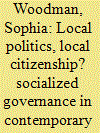

|
|
|
|
|
| Summary/Abstract |
The demise of collective units that attach citizens to the state in China has been overstated; the hegemonic form of Chinese citizenship today links participation and welfare entitlement to membership in a collective unit in a specific locality. This article presents an ethnographic account of the operation of this “normal” form of local citizenship in resident and villager committees in Tianjin. These committees combine participatory and welfare dimensions of citizenship in one institutional setting. Here, citizens are bound to the state through a face-to-face politics that acts both as a mechanism of control and a channel for claims-making, a mode of rule I term “socialized governance,” which blurs the boundaries between political compliance and social conformity, and makes social norms a strong force in the citizenship order. While variably achieved in practice, this form of citizenship represents an ideal that shapes conditions for politics and perceptions of inequality.
|
|
|
|
|
|
|
|
|
|
|
|
|
|
|
|
| 15 |
ID:
149745
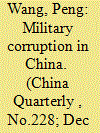

|
|
|
|
|
| Summary/Abstract |
How does guanxi facilitate corrupt transactions? Utilizing fieldwork data and published materials, this paper investigates how guanxi practices distort the formal military promotion system and facilitate the buying and selling of military positions in the People's Liberation Army (PLA). It identifies the three key functions of guanxi in facilitating corrupt transactions: communication, exchange and neutralization. Guanxi enables effective and safe communication among corrupt military officers, holds transaction partners to their word, and neutralizes their guilt about committing corrupt acts.
|
|
|
|
|
|
|
|
|
|
|
|
|
|
|
|
| 16 |
ID:
161058


|
|
|
|
|
| Summary/Abstract |
This paper provides an analytical review of the social science literature on guanxi. The focus of this review is on the prevalence and the increasing significance of guanxi during China's post-1978 reforms, which were implemented to move the country towards a market economy. Since then, researchers have engaged in debates on what guanxi actually means to Chinese people in the past and today, how it has been adaptive to ongoing institutional transformations, and why its influence in economic, social, and political spheres can stabilize, increase or decrease with market reforms and economic growth. The author provides a synthesis of these debates before offering a theoretical framework which provides an understanding of the dynamics of guanxi through the changing degrees of institutional uncertainty and market competition. Survey findings on the increasing use of guanxi in labour markets from 1978 to 2009 are presented to illustrate the usefulness of this framework. In the conclusion, the author argues that guanxi is a five-level variable, and that the nature and forms of guanxi influence are contingent upon whether guanxi is a tie of connectivity, a sentimental tie, a sentiment-derived instrumental tie, an instrumental-particular tie, or an obligational tie that facilitates power and money exchanges. This five-level conceptualization is aimed at advancing future scholarship of guanxi in China's rapidly changing society.
|
|
|
|
|
|
|
|
|
|
|
|
|
|
|
|
| 17 |
ID:
151576


|
|
|
|
|
| Summary/Abstract |
This paper explores the role of guanxi, particularly in its special form of tunqin, in building rural resilience in a poverty-stricken county in north China. The emphasis of this paper is placed on the nature and function of such guanxi. By presenting how guanxi is maintained, this paper also analyses the impact and effectiveness of local guanxi as a strategy to cope with poverty. Whereas tunqin guanxi appears to have built rural resilience in order to cushion villagers against life's upheavals, the maintenance of rural guanxi diminishes this resilience as scarce resources are spent on the exchange of cash gifts, thus aggravating local poverty.
|
|
|
|
|
|
|
|
|
|
|
|
|
|
|
|
| 18 |
ID:
169397


|
|
|
|
|
| Summary/Abstract |
Political control is not the only potential source of interference with judicial independence and impartiality. As the stakeholders in cases, litigants have perhaps the most significant incentive to influence the outcome of judges' decision-making. Based on introducing the concept in Chinese society of interpersonal relationships known as guanxi into a discussion of the nature of judicial power, this article examines a report released by the Caijing magazine about 200 corrupt judges convicted between 1995 and 2013 and argues that in China's society with guanxi embedded as its cultural roots, social pressure from relatives, friends and acquaintances of judges is a major source of external interference in judicial decision-making.
|
|
|
|
|
|
|
|
|
|
|
|
|
|
|
|
| 19 |
ID:
140880


|
|
|
|
|
| Summary/Abstract |
The ideational definition of culture has hindered a meaningful debate of the role that culture plays in the discipline of International Relations. Focusing on the behavior side of culture instead, this paper proposes the Cultural Constructivist approach that takes account of both the cultural and the social in interstate relations. Academic puzzles in contemporary China's relations with Japan, the former Soviet Union, and the United States are better explained by taking into account China's cultural behavior pattern and its role in the country's identity construction of these other states. Cultural Constructivism is a falsifiable theory that enables us to see under which circumstances culture intervenes in a country's foreign policy making. A cultural behavior pattern has complicated the PRC's relations with Japan and the former Soviet Union, but material constraints and cultural differences prevented its ascendance to the main stage of Sino–US relations.
|
|
|
|
|
|
|
|
|
|
|
|
|
|
|
|
| 20 |
ID:
189502


|
|
|
|
|
| Summary/Abstract |
Migrant construction workers are among the most vulnerable working populations in China as they are prone to facing the problem of wage arrears under the multi-tier subcontracting system. Based on ethnographic research of migrant construction workers in Tianjin, Shenzhen, Nanchang and Shaoguan, we examine workers’ divergent responses to wage arrears. While extant literature focuses on the positive role of informal networks in facilitating collective action, our findings indicate that the network structure between labour subcontractors and migrant workers plays a key role in enabling or constraining labour protests. We identify two network structures: the satellite network – characterized by arm's-length relationships between subcontractors and clusters of workers; and the spider-web network – characterized by strong relationships between subcontractors and their workers. We found that workers in satellite networks were prone to stage protests over wage arrears, but those in spider-web networks never held collective actions when facing the same problem. We argue that strong guanxi is a double-edged sword for the mobilization of labour protests and that workers’ responses to wage arrears are mediated through the network structure. Future studies may further scrutinize the role of a social network and its operating mechanisms in shaping workers’ working conditions and labour politics.
|
|
|
|
|
|
|
|
|
|
|
|
|
|
|
|
|
|
|
|
|